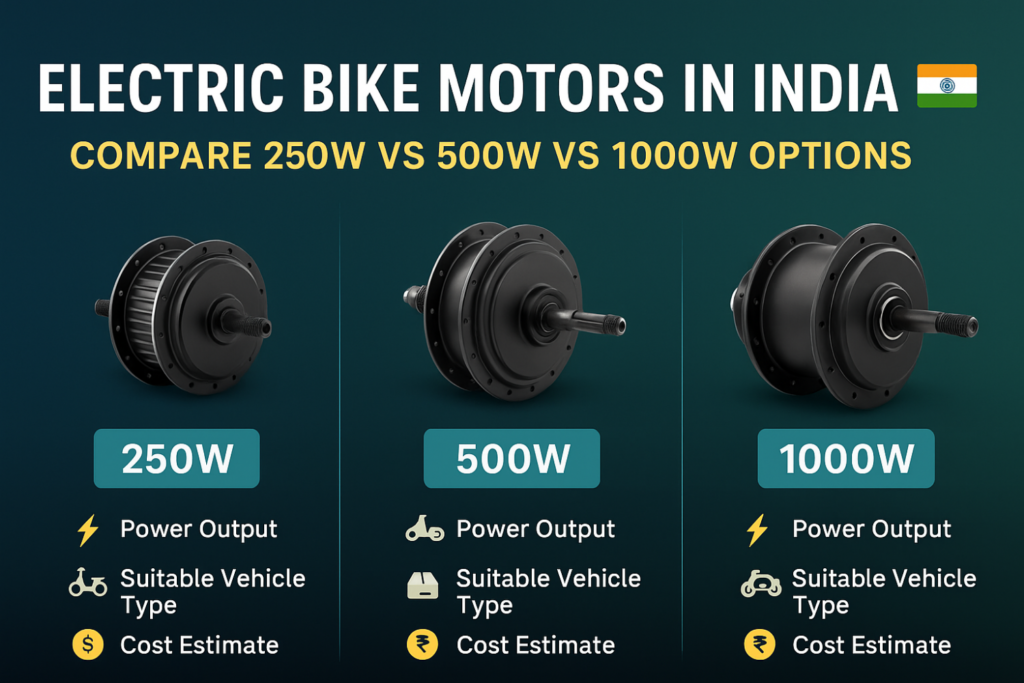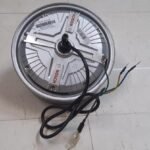
Electric bikes and scooters have become incredibly popular across India. But one of the most confusing decisions while buying or upgrading your EV is choosing the right motor wattage. Should you go for a 250W motor for daily commuting? Or a 1000W motor for better torque and top speed?
In this guide, we break down 250W, 500W, and 1000W motors for Indian riders — covering performance, legality, battery needs, and where to buy them online.
What Does “Wattage” Mean in EV Motors?
Wattage (W) is a measure of motor power. The higher the watts, the more powerful your electric motor is. It affects:
- Top Speed
- Torque and Hill-Climb Ability
- Battery Consumption
- Heat Management
But bigger doesn’t always mean better. Your choice depends on how and where you ride.
250W Electric Bike Motors: The Legal Commuter
Best for: City commuting, students, delivery riders, traffic-prone areas
Top Speed: ~25–30 km/h
Battery Pairing: 48V or 36V
Legality: Street legal in India without a license (as per CMVR)
Pros:
- No license/registration needed
- Light and compact
- Great mileage
- Budget-friendly
Cons:
- Struggles on inclines or with heavy loads
- Slower acceleration
- Not ideal for long distances
500W Electric Bike Motors: Balanced Performance
Best for: Mixed city+suburban routes, mild inclines, slightly faster commutes
Top Speed: 35–40 km/h
Battery Pairing: 48V–60V battery
Legality: Technically requires registration & license (check state RTO)
Pros:
- Noticeable torque boost over 250W
- Can handle moderate hills
- Still efficient with right battery
- Good for lightweight cargo loads
Cons:
- Higher power draw from battery
- Slightly larger controller needed
- Might not be legal without paperwork in some states
1000W Electric Bike Motors: Power for the Pros
Best for: Hilly terrain, long-distance riders, EV enthusiasts, cargo EVs
Top Speed: 45–55+ km/h
Battery Pairing: 60V or 72V lithium battery
Legality: License, registration, and helmet mandatory
Pros:
- Excellent hill climbing and acceleration
- Best for delivery or long commutes
- Handles heavy loads easily
- Suitable for B2B or performance needs
Cons:
- Consumes more battery
- Requires stronger frame and controller
- Not street-legal without full documentation
Which Motor Is Best for You?
| Rider Type | Recommended Motor |
| Student/City Commuter | 250W |
| Daily Office Commuter | 500W |
| Hill Rider or Cargo | 1000W |
| Delivery Riders | 500W–1000W |
| Budget Conscious | 250W |
Pro Tip: Choose the motor based on your route and riding weight (including battery and passenger load).
Matching Battery & Controller
Whatever motor you choose, make sure the controller and battery are compatible.
| Motor | Battery Voltage | Controller Wattage |
| 250W | 36V–48V | 250W–350W |
| 500W | 48V–60V | 500W–800W |
| 1000W | 60V–72V | 1000W–1500W |
Browse Compatible Controllers
Shop Lithium Batteries
Installation & Compatibility
Before buying any motor:
- Check wheel size (e.g., 10-inch, 12-inch)
- Match connectors for throttle, brakes, display
- Ensure the frame can handle motor torque (especially 1000W+)
- Opt for hub motors for simpler installation
Motor Kits With All Accessories
Street Legality in India
According to the Central Motor Vehicles Rules (CMVR):
- 250W & <25 km/h EVs do not require a license
- Anything above 250W or faster than 25 km/h needs:
- Registration
- Driving License
- Helmet
- Number Plate
- Registration
Always follow your local RTO rules.
Real-World Case Example
Rider A commutes 10 km daily in flat areas.
Setup: 250W motor + 48V battery + basic controller
Result: 50 km range, no license issues, runs smooth
Rider B does 30 km in hilly terrain.
Setup: 1000W motor + 72V battery + reinforced frame
Result: Quick, powerful ride, but requires license and proper documents
Where to Buy Reliable EV Motors Online?
You can buy tested, high-quality EV motors and kits across wattages directly from:
Why buy from here?
- Verified sellers
- Fast delivery across India
- Installation help available
- Spare parts and accessories also available
Final Word: Power Meets Purpose
Choosing between a 250W, 500W, or 1000W motor is not about “more is better.” It’s about what fits your usage, legal requirements, and battery budget.
Stick to 250W if you want simplicity and legality.
Go for 500W for a balance of speed and control.
Choose 1000W if you’re serious about power, hills, and cargo.





